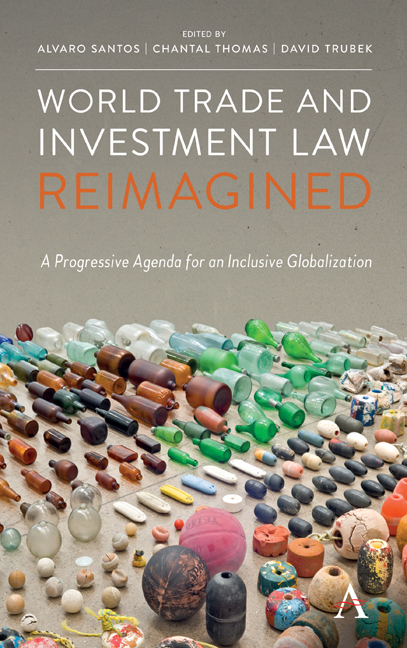Book contents
- Frontmatter
- Contents
- Acknowledgments
- List of Contributors
- Introduction World Trade and Investment Law in a Time of Crisis: Distribution, Development and Social Protection
- PART I RETHINKING THE POLITICAL ECONOMY OF TRADE: COMMENTS ON DANI RODRIK'S STRAIGHT TALK ON TRADE
- PART II SETTING THE STAGE FOR A PROGRESSIVE VISION: EMERGING ISSUES IN WORLD TRADE AND INVESTMENT LAW
- SECTION 1 MAPPING THE NEW CONTEXT FOR TRADE AND INVESTMENT LAW
- SECTION 2 DEALING WITH MAJOR CHANGES IN THE WORLD ECONOMY
- SECTION 3 FRAMING A MORE EQUITABLE INVESTMENT LAW REGIME
- SECTION 4 SUPPORTING DEVELOPMENT
- Chapter Seventeen Bargaining Over Policy Space in Trade Negotiations
- Chapter Eighteen Trumping the IMF: Trade and Investment Treaties and the Regulation of Cross-Border Financial Flows
- SECTION 5 REINFORCING SOCIAL PROTECTION: SPREADING THE BENEFITS OF TRADE, DEALING WITH LOSSES AND EXPLORING THE TRADE–IMMIGRATION NEXUS
- Index
Chapter Eighteen - Trumping the IMF: Trade and Investment Treaties and the Regulation of Cross-Border Financial Flows
from SECTION 4 - SUPPORTING DEVELOPMENT
Published online by Cambridge University Press: 07 September 2019
- Frontmatter
- Contents
- Acknowledgments
- List of Contributors
- Introduction World Trade and Investment Law in a Time of Crisis: Distribution, Development and Social Protection
- PART I RETHINKING THE POLITICAL ECONOMY OF TRADE: COMMENTS ON DANI RODRIK'S STRAIGHT TALK ON TRADE
- PART II SETTING THE STAGE FOR A PROGRESSIVE VISION: EMERGING ISSUES IN WORLD TRADE AND INVESTMENT LAW
- SECTION 1 MAPPING THE NEW CONTEXT FOR TRADE AND INVESTMENT LAW
- SECTION 2 DEALING WITH MAJOR CHANGES IN THE WORLD ECONOMY
- SECTION 3 FRAMING A MORE EQUITABLE INVESTMENT LAW REGIME
- SECTION 4 SUPPORTING DEVELOPMENT
- Chapter Seventeen Bargaining Over Policy Space in Trade Negotiations
- Chapter Eighteen Trumping the IMF: Trade and Investment Treaties and the Regulation of Cross-Border Financial Flows
- SECTION 5 REINFORCING SOCIAL PROTECTION: SPREADING THE BENEFITS OF TRADE, DEALING WITH LOSSES AND EXPLORING THE TRADE–IMMIGRATION NEXUS
- Index
Summary
The trade and investment treaty regime has largely closed the opening in the Articles of Agreement of the International Monetary Fund (IMF) that allow nations to regulate cross-border capital flows. The lack of policy space for regulating cross-border capital flows conflicts with prevailing economic theory and new policy at the IMF that encourages nation-states to regulate cross-border capital flows in certain circumstances. This essay suggests reforms to the treaty system that could make it more conducive to fostering financial stability.
The Need to Regulate Capital Flows
Cross-border financial investments that are not foreign direct investments— such as bonds, stocks, derivatives and other instruments— can be essential parts of government, banking and corporate finance. Indeed, many developing countries may lack the savings or financial institutions that can help finance business activity. Capital from abroad can fill that gap. Therefore, under normal circumstances, the more capital flowing into a developing country, the more the country benefits. However, cross-border capital flows tend to be procyclical: too much money comes in when times are good, and too much money evaporates during a downturn.
A key characteristic of the global financial instability has been mass swings of capital flows across the globe. Indeed, international investment positions now surpass global output. Developing and emerging markets are no strangers to these flows. When the crisis hit, capital rapidly left the developing world in a flight to the safety of the US market. In an attempt to recover, many industrialized nations, including the United States, resorted to loose monetary policy with characteristically low interest rates. Relatively higher interest rates and a stronger recovery triggered yet another surge in capital flows to the developing world. The result has been an increasing concern over currency appreciation, asset bubbles and even inflation.
The East Asian Financial Crisis is a case in point, where surges of short-term capital flows led to upward pressure on exchange rates in a region where competitiveness was the cornerstone of national export-led growth strategies. When global investors speculated that those countries would no longer be able to maintain their competitive exchange rates, there was a sudden stop that caused the region's currencies to collapse and a major crisis to ensue.
- Type
- Chapter
- Information
- World Trade and Investment Law ReimaginedA Progressive Agenda for an Inclusive Globalization, pp. 193 - 200Publisher: Anthem PressPrint publication year: 2019



